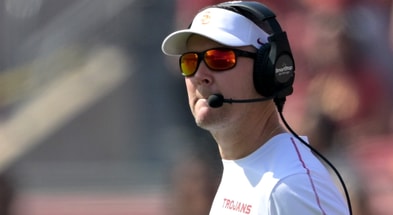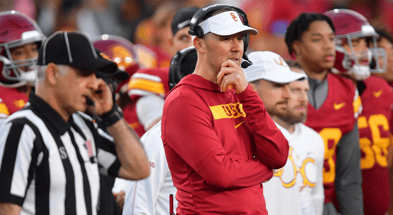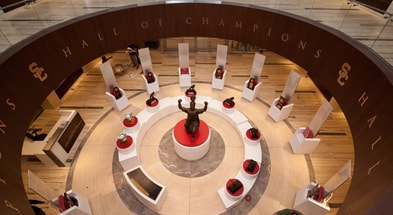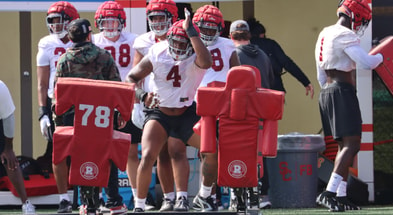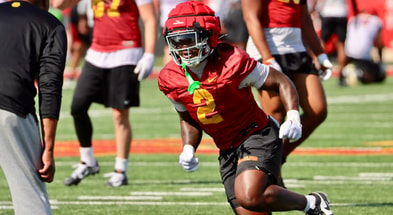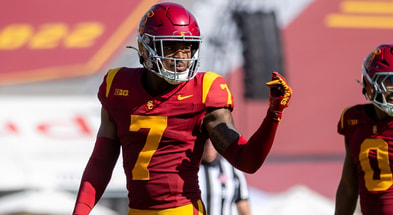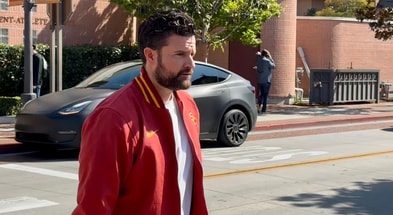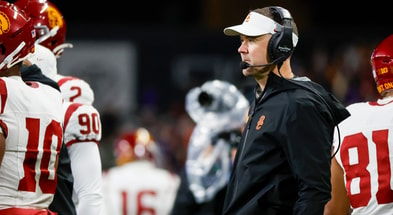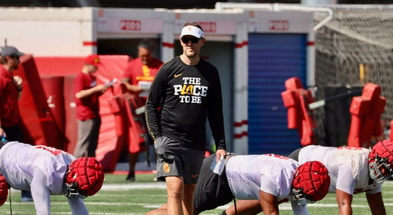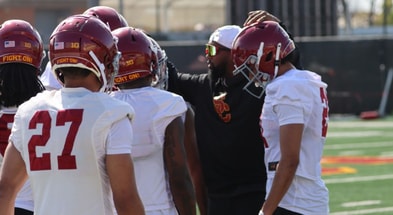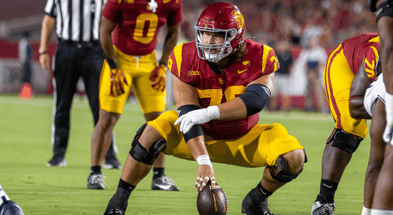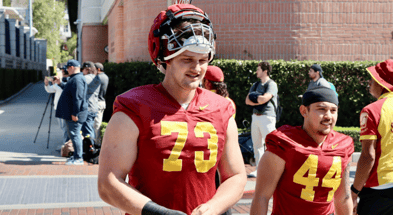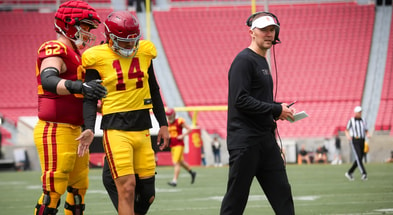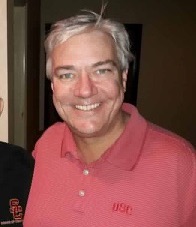Lincoln Riley Reveals His Official Stance on Penalties

USC head coach Lincoln Riley wants his Trojans to commit penalties this season. Sort of. And only sometimes.
During Monday night’s fall camp practice at the Coliseum, USC had officials at practice for the first time this fall. Riley spoke afterward about the importance of having them there and how he views penalties as part of his coaching philosophy.
It’s easy to assume that every coach wants his team to play a clean game when it comes to penalties. Any flag against you swing momentum to the other sideline. But Riley doesn’t see the answer being that black and white.
“The penalty deal is always a fine line,” Riley said. “You go take a look at the end of the season. Typically the teams that have less penalties aren’t any good. And part of it, I think, there’s not enough aggression. If you’re playing this game the way it’s meant to be played, you are going to have some. What we’ve got to teach these guys is they’ve got to be of the aggressive nature.”
Riley said the Trojans have to avoid penalties for infractions after the play is over and what he called “administrative penalties.” Delay of game or procedural penalties would fall into that category.
“Stuff like that is what you have no room for,” Riley said. “The occasional aggressive pass interference, or a hold, or whatever it is, you got to play ball. Those things are going to happen if you’re playing as aggressively as you can. So we’ve been really trying to educate our guys on what the line is. We’ve talked a ton about the physicality and edge we want to play with. That’s number one. But we’ve got to do it within the rules and obviously not shooting ourselves in the foot.”
USC ran two slightly longer team periods during Monday’s practice, than what they’d done through the first three. Riley said there were a lot of penalties during the first session, including one that erased a touchdown and a defensive one that allowed a drive to continue.
“We talked about it a little bit midway through practice,” he said. “Second team period was a lot cleaner in terms of penalties…You tell them in a meeting room. That’s great. But when you get out here and flag’s thrown and it’s on you and moves the group back or the other group forward, it feels a little bit different.”
Riley said they would continue to use officials throughout fall camp, which is far from unusual for college programs.
USC and Riley’s Penalty History
USC had a significant problem with penalties under former head coach Clay Helton.
The Trojans finished tied for No. 120 in the country last year in committing eight penalties per game. Those penalties were good for 75 yards per game, which ranked USC No. 126 in the country.
Top 10
- 1New
Khaman Maluach
State Department ruling impact
- 2
Natty point spread
Odds out for Houston vs. Florida
- 3Hot
Duke controversy
Officials draw ire in Houston win
- 4
Memphis Meteorologist
Crushes critics watching Auburn, Florida
- 5
Zvonimir Ivisic
Transferring to Big Ten
Get the On3 Top 10 to your inbox every morning
By clicking "Subscribe to Newsletter", I agree to On3's Privacy Notice, Terms, and use of my personal information described therein.
Oklahoma finished at No. 84 overall under Riley in penalties per game, with 6.69. The Sooners were No. 77 in penalty yards per game, at 56.38.
Checking Riley’s Suggestion on Least-Penalized Teams
Just using 2021 statistics, Riley isn’t far off when suggesting the type of team that finishes a season without committing many penalties. Though, it’s not exactly that clean cut.
Louisiana Monroe finished the season No. 1 in both fewest penalties and fewest penalty yards per game. The Warhawks went 4-8.
The 2-10 Kansas Jayhawks finished No. 2 in the nation in penalty yards per game. LSU finished No. 3, and also 6-7 on the year. Eastern Michigan was No. 4, with a 7-6 record.
From the Pac-12, Washington finished No. 1 in the conference and in the top 15 nationally in both categories. The Huskies were 4-8.
Georgia, the 2021 national champions, finished No. 29 in penalties per game and No. 21 in penalty yards per game. So as Riley said, it’s not as if the goal is to pile up penalties and finish completely at the other end of the spectrum. But Alabama, the other national finalist, was No. 106 and No. 113 in those two categories, respectively.
It’s clear Riley won’t be rooting for his Trojans to draw flags constantly. The nuanced look at the topic is an interesting one, however. And it provides a little more detail into the type of culture and mindset he’s looking to build at USC.




